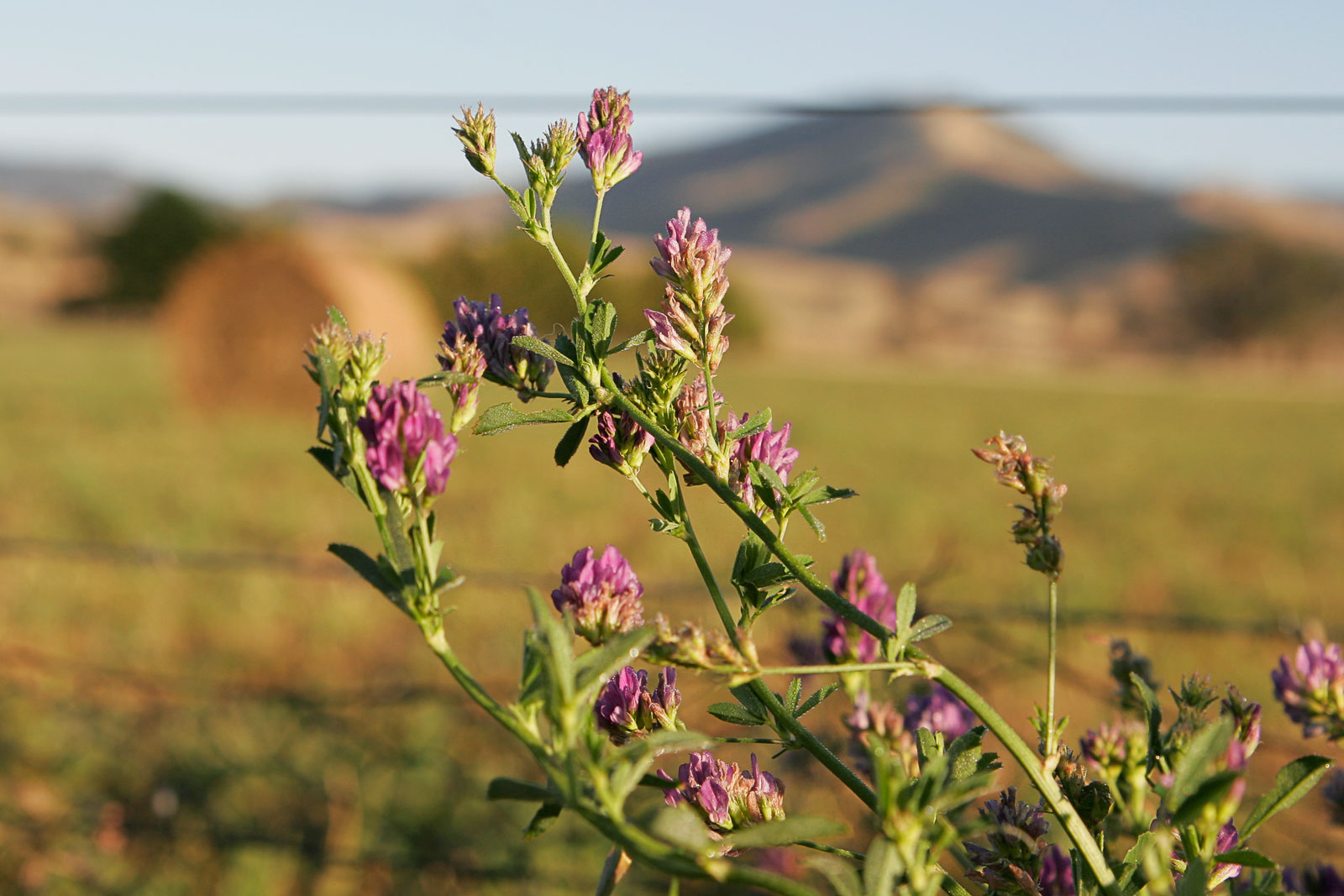Common Names and Other Names:
- Alfalfa
- Lucerne
- Purple Medic
- Buffalo Herb
- Chile Clover
- Medicago
Where Does It Occur:
Alfalfa is native to Southwest Asia and the Eastern Mediterranean region but has been cultivated worldwide due to its agricultural importance. It is grown extensively in:
- North America
- Europe
- Asia
- Africa
- Australia
Alfalfa thrives in a variety of climates but prefers temperate regions with well-drained soils. It is commonly found in:
- Agricultural Fields
- Grasslands
- Meadows
- Pastures
Basic Ingredients (Nutritional Profile):
Alfalfa is rich in nutrients and bioactive compounds, including:
- Vitamins:
- Vitamin K
- Vitamin C
- Vitamin E
- B Vitamins (B1, B2, B3, B5, B6)
- Minerals:
- Calcium
- Magnesium
- Potassium
- Iron
- Zinc
- Copper
- Manganese
- Phytoestrogens:
- Coumestrol
- Isoflavones
- Saponins:
- Compounds that may help lower cholesterol levels.
- Amino Acids:
- Contains essential amino acids necessary for protein synthesis.
- Dietary Fiber:
- Supports digestive health.
- Antioxidants:
- Chlorophyll
- Carotenoids
Most Commonly Used For Treatment Of:
- Cholesterol Management:
- May help reduce total and LDL (bad) cholesterol levels due to its saponin content.
- Digestive Health:
- High fiber content aids in digestion and helps alleviate constipation.
- Blood Sugar Regulation:
- May assist in stabilizing blood glucose levels.
- Anti-Inflammatory Effects:
- Reduces inflammation, potentially benefiting conditions like arthritis.
- Menopause Symptoms:
- Phytoestrogens may help alleviate symptoms such as hot flashes.
- Diuretic Properties:
- Promotes urine flow, aiding in detoxification.
- Vitamin and Mineral Supplementation:
- Used as a natural source of essential nutrients.
Side Effects:
While alfalfa is generally safe for most people when consumed in moderate amounts, potential side effects include:
- Autoimmune Reactions:
- May exacerbate symptoms in individuals with autoimmune diseases like lupus due to the amino acid L-canavanine.
- Gastrointestinal Issues:
- Bloating
- Gas
- Diarrhea
- Photosensitivity:
- Increased sensitivity to sunlight, potentially leading to sunburn.
- Allergic Reactions:
- Skin rash, itching, or hives in sensitive individuals, especially those allergic to legumes.
- Blood Sugar Levels:
- May lower blood sugar; diabetics should monitor levels closely.
- Interaction with Medications:
- May interact with immunosuppressants, anticoagulants, and contraceptives.
Available Forms in the Market:
- Dried Leaves and Stems:
- Used to make teas and infusions.
- Sprouts:
- Consumed fresh in salads and sandwiches.
- Powdered Supplements:
- Added to smoothies, juices, or taken as a supplement.
- Capsules/Tablets:
- For convenient dosing of alfalfa extract.
- Liquid Extracts and Tinctures:
- Concentrated forms for internal use.
- Seeds:
- For sprouting or planting.
- Topical Preparations:
- Creams or ointments containing alfalfa for skin applications (less common).
Research and Results:
- Cholesterol Reduction:
- Study: “Effects of alfalfa meal on cholesterol metabolism in monkeys.”
- Findings: Alfalfa meal reduced plasma cholesterol levels by increasing fecal excretion of neutral steroids.
- Link: Atherosclerosis Journal
- Blood Sugar Regulation:
- Study: “Hypoglycemic effect of alfalfa sprouts in diabetic rats.”
- Findings: Alfalfa sprouts reduced blood glucose levels in diabetic animal models.
- Link: Pakistan Journal of Pharmaceutical Sciences
- Antioxidant Properties:
- Study: “Antioxidant activity of alfalfa leaf protein concentrates.”
- Findings: Alfalfa leaf extracts showed significant antioxidant activity.
- Link: Food Chemistry
- Anti-Inflammatory Effects:
- Study: “Anti-inflammatory properties of alfalfa seeds extract.”
- Findings: Demonstrated reduction in inflammation markers in animal models.
- Link: Journal of Ethnopharmacology
Note: While these studies are promising, most are preliminary or conducted on animals. More clinical research on humans is needed to confirm efficacy.
Precautions:
- Autoimmune Diseases:
- Avoid Use: Individuals with lupus or other autoimmune conditions should avoid alfalfa due to the presence of L-canavanine, which may stimulate the immune system.
- Pregnancy and Breastfeeding:
- Use with Caution: Alfalfa contains phytoestrogens; consult a healthcare provider before use.
- Blood Disorders:
- Vitamin K Content: High vitamin K levels may affect blood clotting; individuals on anticoagulant therapy (e.g., warfarin) should monitor intake.
- Diabetes:
- Monitor Blood Sugar: May lower blood sugar levels; diabetics should adjust medications accordingly.
- Medication Interactions:
- Immunosuppressants: May reduce the effectiveness of drugs like cyclosporine.
- Hormonal Therapies: Phytoestrogens may interact with contraceptives or hormone replacement therapy.
- Anticoagulants: High vitamin K content may interfere with blood thinners.
- Allergies:
- Individuals allergic to peanuts, soy, or other legumes may have cross-reactivity.
- Children:
- Use with Caution: Not enough data on safety; consult a pediatrician before use.
- Contaminated Sprouts:
- Risk of Bacterial Contamination: Raw alfalfa sprouts may harbor bacteria like E. coli or Salmonella; proper handling and thorough washing are essential.
Conclusion:
Alfalfa (Medicago sativa) is a nutrient-rich plant with a variety of traditional medicinal uses, including supporting cardiovascular health, aiding digestion, and providing antioxidant benefits. Its high content of vitamins, minerals, and bioactive compounds contributes to its potential health-promoting effects.
Recommendations:
- Consult a Healthcare Professional: Before incorporating alfalfa into your health regimen, especially if you have underlying health conditions or are taking medications.
- Moderation is Key: Use alfalfa products as directed to minimize potential risks.
- Quality Assurance: Purchase products from reputable sources to ensure purity and safety.
- Proper Handling of Sprouts: Be cautious with raw sprouts; consider cooking them to reduce the risk of bacterial contamination.
Disclaimer: This information is intended for educational purposes and should not replace professional medical advice. Always consult a qualified healthcare provider for personalized guidance before using alfalfa for medicinal purposes.
« Back to Glossary Index